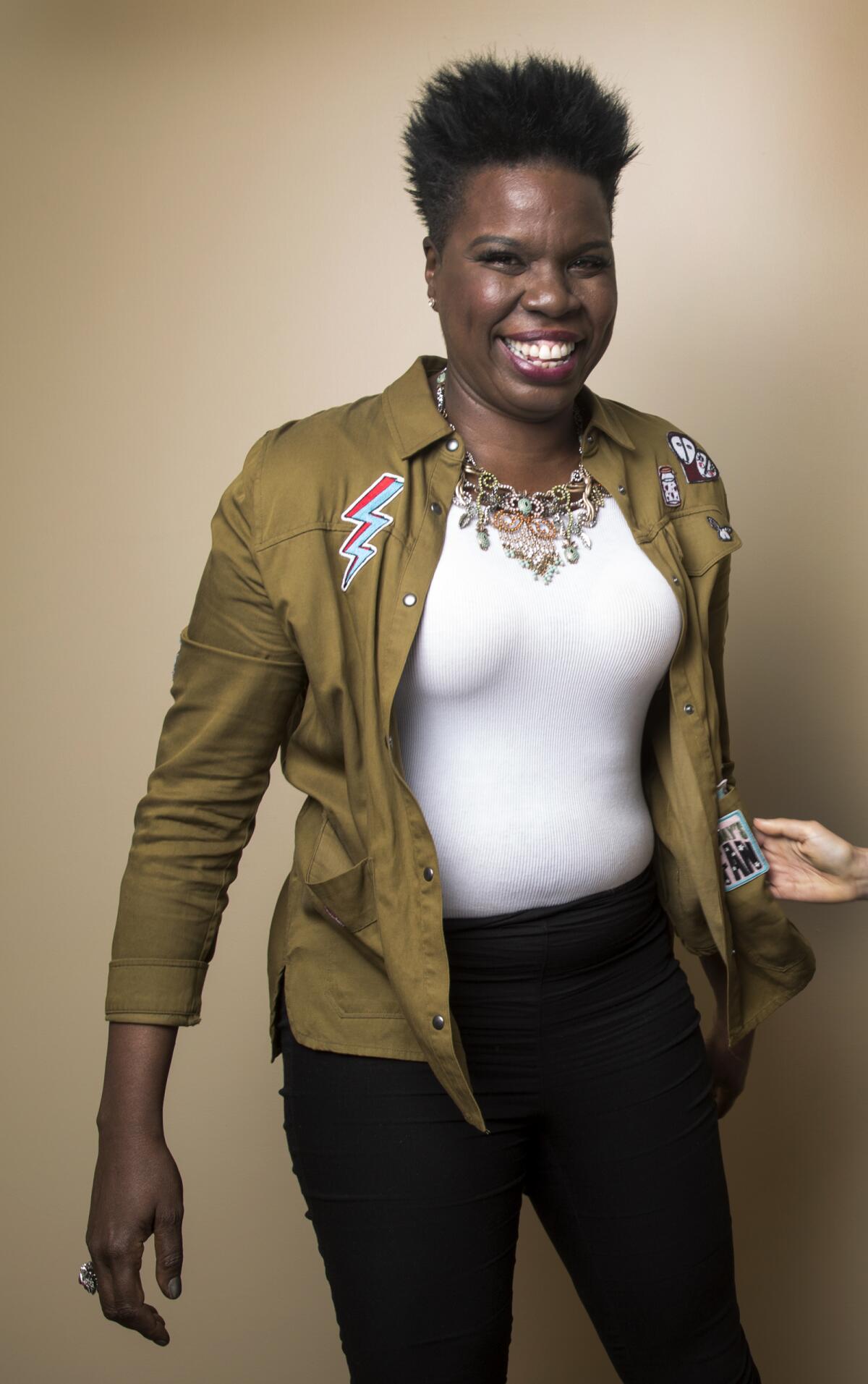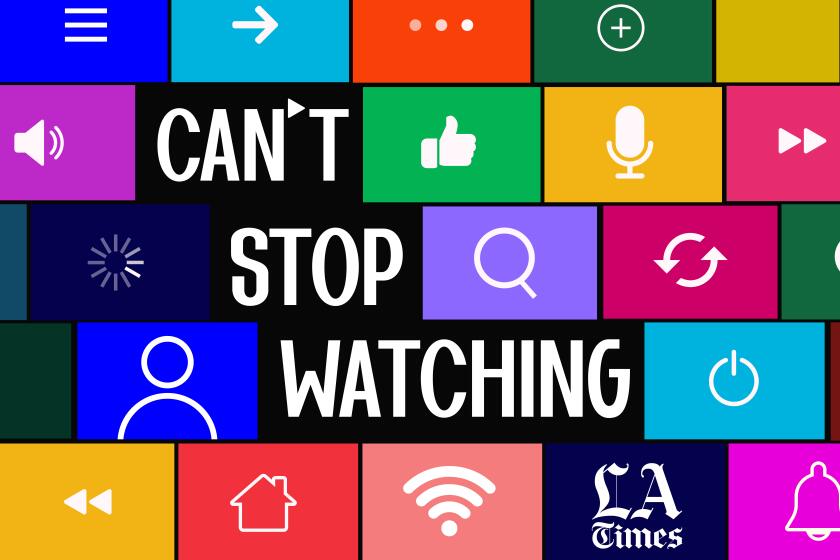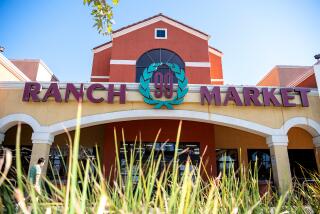The ‘Supermarket Sweep’ reboot wants to be a nostalgia trip to life before COVID-19
- Share via
In any other year, people sprinting like maniacs through fully stocked grocery store aisles — hurriedly filling their carts with frozen turkeys and containers of baby formula — would make for an escapist TV romp. And the team behind the upcoming revival of “Supermarket Sweep” hopes that‘s still the case.
Even at a time when a trip to the market can be its own stress test.
The update to the beloved game show was announced back in January, when time still felt chronological and distinct, and was scheduled to begin shooting in mid-March for a summer launch. But it became one of the many productions upended as Hollywood came to a halt in compliance with the state’s stay-at-home orders due to the COVID-19 pandemic.
“We were set to load in the Monday after the order was given,” says Alycia Rossiter, an executive producer and co-showrunner of the new series. “We thought: Let’s put this on pause and see what happens ... and a heck of a lot did happen.”
But with a mix of video conference strategizing, an enthusiastic host in “Saturday Night Live” alumna (and TV super fan) Leslie Jones and a number of safety initiatives, “Supermarket Sweep” found itself back in the game. Premiering Oct. 18 on ABC, it’s one of the few series expected to launch during a fall broadcast season that, in comparison to years past, will give a glimpse of the pandemic’s toll on TV’s pipeline.
To kick off our 2020 fall TV preview, the Times TV team selects the 15 shows we’ll be watching this fall — and that you should be watching too.

Originally broadcast in the 1960s, “Supermarket Sweep” had its first revival in the 1990s, with host David Ruprecht, and became a cornerstone of the wacky and wholesome game-show circuit with its dream-like premise of winning cash while answering questions about household essentials and pushing a shopping cart recklessly down grocery aisles.
The enthusiasm fans have for the show, boosted by their desire to compete on it, is what Rob Mills, senior vice president of alternative series, specials and late night at ABC, found enticing about reboot — specifically, the enthusiasm Jones had for it. As Mills tells it, the comedian’s retelling of her ill-fated attempt to get on the show with her roommate way back when — they got to the final round of auditions but her roommate left because she had only taken a half-day off of work — is what landed the show a home at ABC.
“We never even heard about what the plans were for [what] the new version of ‘Supermarket Sweep’ was going to be like,” Mills says. “We sort of bought the show on the spot. We bought the show because of Leslie — and knowing that it’s a great brand.” One additional plus: The property has seen a nostalgic resurgence, with select episodes available to stream on Netflix and Amazon Prime.
But it’s hard to ignore the backdrop against which this new version of “Supermarket Sweep” finds itself set. Grocery stores were deemed essential businesses early on in the pandemic’s narrative, as skittish consumers scrambled to stock up on items to sustain them in lockdown. A trip these days requires a mask, abiding by six-foot guide markers on the ground, and standing in checkout lines with Plexiglas barriers shielding the cashiers. And bare shelves, particularly in the household cleaning section, are still a common sight all these months later.
“We bought [the show] probably a year ago and since the pandemic happened, it has been interesting to watch the reaction to the old episodes, particularly when they put it on Netflix,” Mills says. “There was almost a comfort-food aspect to it. It brought you back to a time when we gathered in supermarkets. Even though we still do that, it’s in a much different way. I think that’s why this is probably the right time for the show.”
Virtual meetings became a near-daily occurrence for the show’s team during the hiatus, a means to brainstorm ways to safely begin work when the time came. Production company Fremantle, a stalwart in the unscripted space with shows like “American Idol” and “America’s Got Talent,” had the advantage of seeing how its titles in other countries navigated filming during the pandemic, including the live finale for “Italy’s Got Talent.”
“It was a lot of planning and constantly updating,” says Dan Funk, Fremantle’s executive vice president of unscripted production. “As more and more information came out, we would adjust things so that by the time we started production, we knew what the outline of the protocols would be about how to move forward and keep everyone safe.”
Unable to rehearse segments on set, Jones refined her hosting through Zoom run-throughs every week, beginning in March and culminating in July — once she was able to travel to Los Angeles.
TikTok posts about the crime drama “Criminal Minds,” now streaming on Netflix, have amassed more than 1.5 billion views. We wanted to know why.
Roughly four months after its intended production start date, shooting for “Supermarket Sweep” began July 31 and spanned less than two weeks — with one and a half shows completed per day of production.
There was frequent testing, hand-sanitizing stations, protective equipment and limited contact — all in compliance with suggestions issued by Hollywood’s unions, as well as state and local guidelines. The small crew was zoned off into groups to limit cross-contamination — for example, the camera operators and the camera assistants were all assigned a specific color zone. Members of each zone were assigned specific bathrooms and designated areas to consume meals. When communication needed to happen between groups, it was done over walkie-talkies, cellphones, or the production communication line.
The talent, which included the host and contestants who would be on set without masks when cameras rolled, as well as those in close contact with them, were tested more frequently, up to three times a week. And there was a safety compliance team on set, warning people if they weren’t wearing their mask correctly or failing to observe the required six-foot distance from coworkers.
Selected back in March, contestants who had once been eager to whiz through brightly lighted grocery aisles and snap up bonus cash attached to inflatable spearmint gum like it was 1993 found themselves weighing the health risks. The contestants, who arrived two days ahead of their call time to take nasal swab tests, are mostly local — but at least one player, concerned about flying in this time, made the drive from North Carolina.
“It gave us the confidence ... that the fear of the unknown is behind us now,” says Joni Day, Fremantle’s senior vice president of alternative programming and development. “Now we know we can do it.”
The set was housed inside the Barker Hangar, a 35,000-square-foot aircraft hanger at Santa Monica Municipal Airport. Electrostatic sprayers were used to disinfect the grocery items, allowing for a large swath of inventory to be sanitized more quickly.
“It was like a ‘Ghostbusters’ team going in and cleaning our set,” Rossiter says.
Hear interviews with TV stars in the new L.A. Times podcast ‘Can’t Stop Watching.’

Contestant podiums featured in the early half of the show were adjusted to be six feet apart, while Jones was situated at a greater distance than she would be under normal circumstances. And the studio audience was eliminated to reduce the number of people on set. But it’s a void that co-showrunner Wes Kauble says feels less palpable when you have a host like Jones — who proved as much last month as host of the Emmy nominations announcement.
“What makes Leslie really special as a host and uniquely talented in the way we needed to be during this COVID era, whether she’s performing for six people or 600 people, she’s giving you the same energy, the same comedy — all that stuff,” Kauble says. “She was playing to the crowd even though there wasn’t a crowd there.”
The lack of a live studio audience isn’t the only reflection of our current reality that viewers may notice: Producers say the show will pay tribute to grocery store employees, who have emerged as frontline workers of the pandemic. Nor did all that unused inventory go to waste. Ninety-five pallets of perishable and nonperishable food — each holding up to 4,600 pounds — were donated to local charities, including the Los Angeles Regional Food Bank and the Los Angeles Mission. The majority of meat was donated to local wildlife organizations, such as the Rancho Wildlife Foundation, while an assortment of pet food and supplies was donated to the Rescue Train, a local pet-welfare organization.
Still, the show’s format wasn’t overhauled to lean into the new normal of grocery shopping today. Early on, thought had been given to having the contestants wear masks, but producers quickly nixed that plan. And, no, viewers won’t suddenly notice that vats of hand sanitizer, rafts of toilet paper and hard-to-find disinfectant wipes are big-money items in “Supermarket Sweep.” That isn’t the reboot viewers need right now, producers say.
“Game shows are supposed to be an escape. They’re supposed to be a moment where you can just check out and live in a fantasy world and engage with the game material and scream at the contestant for not putting enough turkeys in their cart,” Day says. “We wanted to keep it pure and timeless just so it can be what it’s supposed to be and nothing else.”
'Supermarket Sweep'
When: Premieres Sunday, Oct. 18
Where: ABC
Rating: Not rated
More to Read
The complete guide to home viewing
Get Screen Gab for everything about the TV shows and streaming movies everyone’s talking about.
You may occasionally receive promotional content from the Los Angeles Times.








